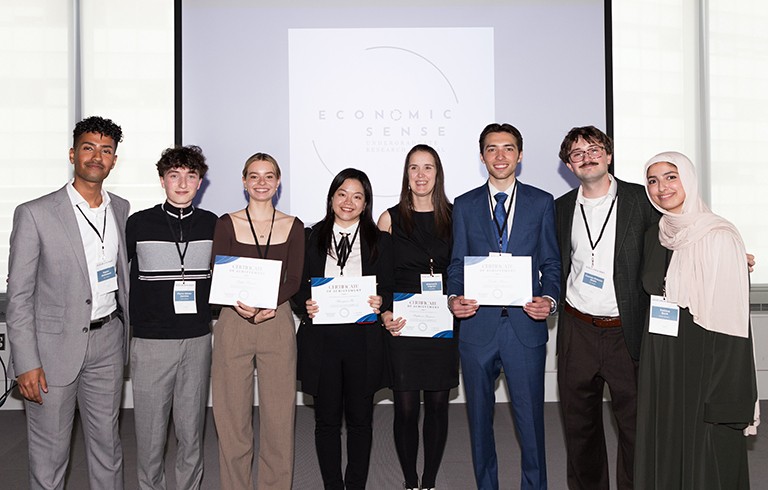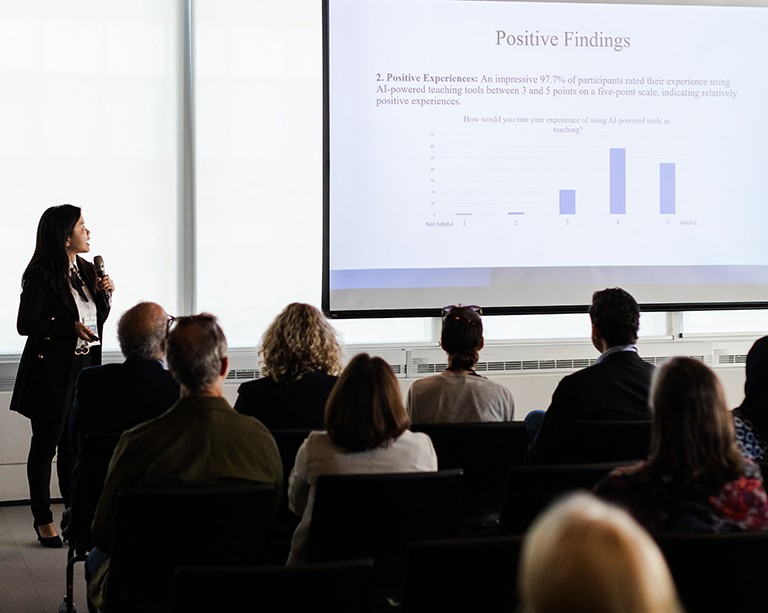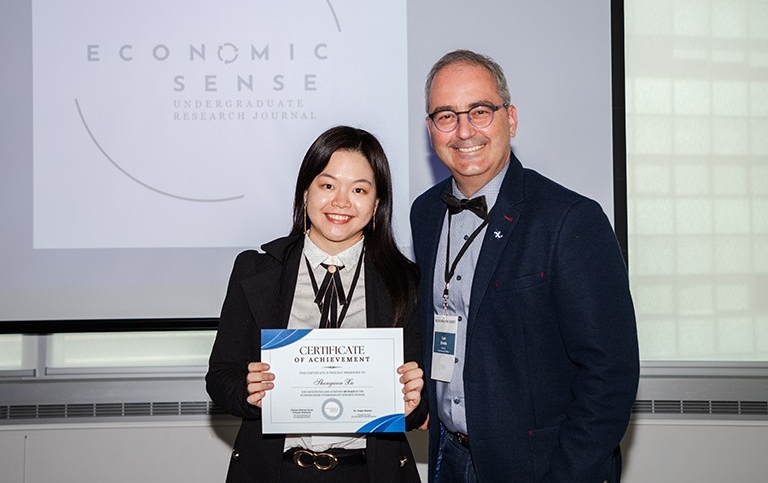Concordia students launch EconomicSense, an interdisciplinary journal for undergraduate research
 From left: Co-founder Rayan Mohamed, Pierre-Olivier Cormier, Sophie Beaudet, Shengwen Xu, Stéphanie Gagnon, Derek Manzo, co-founder Charles-Étienne Sirois and Fatima Bark. | All photos by Alexis Shareck
From left: Co-founder Rayan Mohamed, Pierre-Olivier Cormier, Sophie Beaudet, Shengwen Xu, Stéphanie Gagnon, Derek Manzo, co-founder Charles-Étienne Sirois and Fatima Bark. | All photos by Alexis Shareck
Concordia undergraduate students now have an opportunity to produce and publish original scholarly research on economics with the support of one-on-one mentorship.
Launched this year by two Concordia students, EconomicSense is an academic journal designed to support early-career researchers to learn the ins and outs of scholarly publishing.
EconomicSense was founded by economics students Charles-Étienne Sirois and Rayan Mohamed. Torn between creating a journal, a case competition or a speaker and networking event series, the students decided to combine all three.
“We wanted to help students to engage deeply with economics and the mechanics of producing scholarship,” Mohamed explains, “and show them that economics encompasses much more than supply and demand. It's a gateway to the idea of interdisciplinary research.”
The result is EconomicSense. The journal’s editorial team selects a handful of applicants and supports their research by providing industry and faculty mentorship. Top submissions are then recognized based on the paper’s quality and a presentation of the researchers’ findings at a research summit.
 First place winner Shengwen Xu presenting to the audience at EconomicSense Journal's inaugural Research Summit.
First place winner Shengwen Xu presenting to the audience at EconomicSense Journal's inaugural Research Summit.
A peer-led introduction to academic publishing
“Our goal with EconomicSense was not just to give students a platform to write new research but also to teach them how to do it,” Mohamed explains. “This is why we integrated a mentorship program.”
“As full-time students who are involved in other extracurriculars and internships, the learning process has been incredibly steep, but our mentors and all the people who offered to help and direct us as we moved forward have been crucial in our success.
The journal has already received support from the Department of Economics and its chair, professor Jorgen Hansen, as well as the Concordia Council on Student Life and the Economics Student Society.
“The greatest encouragement was the university’s belief in the project’s potential to add value to student lives,” Mohamed adds.
Students research attracts industry leaders
The four-person editorial team is composed of Sirois, Mohamed and fellow economics students Pierre-Olivier Cormier and Fatima Bark.
The journal received over 50 submissions for its inaugural issue, “21st Century Problems and Solutions.” The team narrowed the pool to five applicants. who were each paired with mentors from industry and academia to help guide their research over a four-month period.
Mentors included John Molson professors, as well as executives from companies and organizations like Deloitte, the Conseil de l’innovation du Québec and ABB E-Mobility.
The resulting papers covered topics related to innovation, finance, sustainability, security and supply chains and globalization and were evaluated by a panel of judges that included Concordia professor Ann-Louise Davidson, assistant professor Gabrielle Vasey and Thomas Ledwell, a leading consultant in strategy, governance and communications.
Researchers showcased their work at the research summit on May 18 at the Concordia University Conference Centre.
After a keynote presentation by Ledwell, the researchers were each given five minutes to present their findings to the audience.
Concordia administrators and faculty, as well as corporate leaders from organizations like CIRANO, Cycle Momentum, Propulsion Québec and Bombardier, comprised the 70-person audience.
 Shengwen Xu with mentor Luc Sirois, Chief Innovation Officer at the Conseil de l’innovation du Québec.
Shengwen Xu with mentor Luc Sirois, Chief Innovation Officer at the Conseil de l’innovation du Québec.
Exploring economics through an interdisciplinary lens
First-year economics student Shengwen Xu took home the top prize for her paper, “An Analysis Regarding the Impact on Education Brought by Artificial Intelligence.”
Xu’s paper reviewed existing literature and presented data from a survey that was distributed to Quebec-based educational practitioners by the Conseil de l’innovation du Québec. Xu developed the questionnaire to explore how respondents had seen or personally used AI tools in their practice.
“I am just starting to study economics and I like it so far. I thought the journal would be a great opportunity to explore the field beyond the fundamental courses to see how much I am interested in it,” she says.
Although Xu says she was nervous before presenting her research, she was pleased with her experience at the summit.
“I was very impressed. I learned that economics includes many different branches and can be combined with many different industries. I will continue to study it, but this experience opened up my interest in technology, so it would be interesting to explore both fields.”
Xu received mentorship from Luc Sirois, chief innovation officer at the Conseil de l’innovation du Québec.
“Luc paid very close attention to every stage of my writing process,” Xu explains. “He gave me a lot of advice on how to improve my research and helped me access educational practitioners. This research would not have gone smoothly without his help.”
Submissions are open
The first issue of EconomicSense is in the final stages of editing and will be available soon. The journal’s team is deeply grateful for the significant interest it has received from peers, faculty and external organizations, such as the Association des économistes Québécois, which has also offered three-year memberships to the executive team and the winners from the research summit, free of charge.
The only submission requirement for EconomicSense is that each writer must be a current Concordia undergraduate student. Beyond this, Mohamed says that the journal is open to applicants from across disciplines.
“EconomicSense is not limited to economics students. We want to integrate with more faculties, more departments, and more majors overall to help students learn how scholarly research can help deepen their understanding of economics and of big research questions.”
Find out more about Concordia’s Department of Economics.


